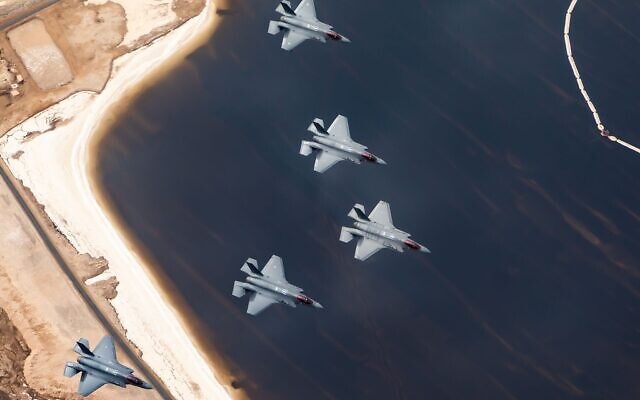David Barnea says agency will ‘do everything needed to alleviate threat,’ but air force head won’t say if Israel can destroy Iran’s program and report claims IDF has no strike plan

The head of the Mossad spy agency said Thursday that a bad nuclear deal between world powers and Iran would be “intolerable” for Israel, vowing that the Islamic Republic will never acquire nuclear weapons.
“It’s clear that there’s no need for uranium enriched to 60 percent for civilian purposes,” David Barnea said during a ceremony at the President’s Residence to honor exceptional Mossad agents. “There’s no need for three enrichment sites. There’s no need for thousands of active centrifuges — unless, that is, there is an intention to develop nuclear weapons.”
“A bad deal, which I hope will not be made, is intolerable to us,” he added. “Iran is striving for regional hegemony, wages terrorism that we are blocking every day around the world, and is continuously threatening stability in the Middle East.”
“Our eyes are open, we are prepared, and we will do with our partners in the security establishment everything that is necessary to alleviate the threat against Israel and thwart it by any means,” Barnea said.
“Iran will not have nuclear weapons — not in the coming years, not ever. That is my promise, that is Mossad’s promise.”
Barnea’s comments came as negotiations resumed in Vienna between Iran and world powers on restoring the 2015 agreement that limited Tehran’s nuclear program in exchange for sanctions relief.

Israel vocally opposed that deal and has urged the Biden administration — which is seeking to rejoin the accord — to end the talks, charging that Iran is using the negotiations to buy time to advance its nuclear work.
Iran is currently enriching uranium to 60% purity, which is just a short technical jump from weapons-grade, and far exceeds the cap set in the 2015 nuclear deal. There is no civilian use for 90% enriched uranium.
Israel has lobbied for its allies to scrap the 2015 deal altogether, instead seeking a better arrangement or heavy sanctions backed by a credible military threat.

Asked about plans for a potential strike on Iranian nuclear sites during a rare television interview aired Thursday, Air Force head Maj. Gen. Amikam Norkin said the IDF was prioritizing preparations for such a possibility.
However, he did not directly respond when asked by Channel 13 news if the air force can fully neutralize the threat of a nuclear Iran.
“We always need to be ready with a military option and therefore this has become high priority,” he said.
“We make mistakes; we’re improving,” said Norkin, while remaining evasive when asked about the Israeli Air Force’s capabilities and the immediate threat posed by Iran.
Norkin compared Israel to an “insurance policy” against Iran obtaining a nuclear bomb. Asked if that insurance policy would need to be exercised, he said: “We’ll do whatever is required.”

The Walla news site reported Thursday that Israel does not currently have operative plans to strike Iran’s nuclear program.
The report, which did not cite sources, said the military was working on plans of action should a strike become necessary, but that training for such a mission has not yet begun, and will take several months to complete.
Once those are complete, the Israel Defense Forces will be able to provide Israeli leaders with a detailed military option, the report said.
Earlier this week, Foreign Minister Yair Lapid told French President Emmanuel Macron that only a credible military threat will stop Iran’s nuclear program. Senior Israeli officials have blitzed their counterparts in the US, UK, France and Germany in recent days in a bid to lobby against nuclear talks with Iran, which kicked off Monday after an extended hiatus.
The Biden administration has repeatedly reiterated its desire to return to the 2015 agreement, known as the Joint Comprehensive Plan of Action, which former president Donald Trump exited. Following its exit, the US began reinstating sanctions on Tehran while Iran began to openly breach the deal’s terms.
The Biden administration has repeatedly said that it would only lift sanctions in return for concrete and evident changes in Iran’s behavior, and that not all sanctions would be lifted.
As reported by The Times of Israel
